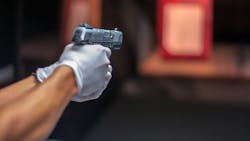Human Testimony at Question
Just like I do most mornings, I scrolled through the news particular to law enforcement to see what might need attention – or what I can learn from. This morning I saw an article titled, “Md. Court Weighs Limiting Ballistic Evidence Linking Guns in Shootings.” Because I live in Maryland I had to check it out. (You can find more here: officer.com/21289000)
As I read I wasn’t surprised at what I found. The article focuses around wording in a Firearm Examiner’s testimony and what should be allowed. For anyone not sufficiently familiar with court proceedings, lawyers will argue the minutia of anything and the English language offers plenty to argue. At the heart of this case is whether a Firearms Examiner can testify that a specific gun fired a specific bullet or whether their testimony has to be limited to saying that a gun cannot be ruled out as having fired the bullet.
This might seem a minor change but the implication is vast. One is a finite statement and offers solid evidence linking a fired projectile to the gun that fired it. This is a positive and unquestionable match. If that gun can then be positively linked to the person who pulled the trigger, then A+B means that the person matched to the gun fired that bullet.
The second statement, though, means that the gun MIGHT have fired the bullet in question. The testimony has to be that there’s nothing proving the gun didn’t. That is not the same and offers a measure of doubt in the evidence. “Guilty beyond a reasonable doubt” is the standard for conviction in criminal court proceedings so this one simple change may well be the change that lets a guilty criminal walk free.
Should such a change end up mandated by a decision of the Maryland Supreme Court, then what will happen is that a ton of money will be spent to undertake a study (probably nationwide because the case will have nationwide implications) to show that the chances of a single bullet having matching markings to a given gun is so totally unique that while the testimony might be “that gun can’t be ruled out,” the evidence says that the chances of that being the wrong gun are a bazillion to one (or some such). Firearms Examiners will become the next DNA experts with tool markings being the DNA of a gun and traceable to not only the fired projectiles but the ejected brass as well (as it is and should be).
What’s even worse is the question quoted in the article from an associate professor (Maneka Sinha) at the University of Maryland Francis King Carey School of Law: “Is a firearms examiner capable of discerning the difference?” This professor’s question implies that even if the projectile DOES have the appropriate markings and those markings CAN be linked to a specific weapon, the firearms examiner may not have the skill, expertise and perfection to identify them appropriately. This hints at the fallibility of human beings in general. The professor seems to be hinting that any evidence, as scientifically supported as it may be, interpreted by an expert, may not be “real” evidence because humans inherently are capable of making mistakes.
THAT is a truly scary thought. The continued implication is that any evidence offered or interpreted by any human being is invalid because humans are imperfect. With one such court decision, based on Sinha’s outlook, any and all testimony based on human observation would be nullified. Last time I checked, 100% of all convictions are based on human testimony even if it’s simply testimony about evidence as gathered and analyzed.
Reality check: Our court system is not infallible. I believe it’s the best one the world has ever seen, but because it is operated by humans within a structure created by humans, there remains the potential for mistakes. To invalidate an entire legal system simply because humans operate within it is… crazy. The end result would be NO legal system; an entire structure of laws and controls that are 100% unenforceable and therefore might as well not even exist.
Let’s not go down that rabbit hole, eh? Let’s just accept that experts, as vetted by our courts, are exactly that and, barring proven mishandling of evidence, accept their testimony as valid. Questioning specific parts of a scientific process is one thing. Questioning any human being because they have the audacity of existing as human beings is utter lunacy.
About the Author
Lt. Frank Borelli (ret), Editorial Director
Editorial Director
Lt. Frank Borelli is the Editorial Director for the Officer Media Group. Frank brings 20+ years of writing and editing experience in addition to 40 years of law enforcement operations, administration and training experience to the team.
Frank has had numerous books published which are available on Amazon.com, BarnesAndNoble.com, and other major retail outlets.
If you have any comments or questions, you can contact him via email at [email protected].

